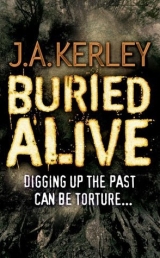
Текст книги "Buried Alive"
Автор книги: Jack Kerley
Жанры:
Триллеры
,сообщить о нарушении
Текущая страница: 5 (всего у книги 19 страниц)
11
Cherry returned me to my car and waved off my offer of conversation to pass the time while she did paperwork. I went back to the cabin to empty Mr Mix-up, passing Charpentier’s house. A lone figure was visible behind the cabin, hoeing in the garden. I waved, but the psychologist was too absorbed in his task to notice.
I’d been back at Road’s End all of ten minutes when McCoy appeared. I held my fingertips an inch distant from my ear holes. “If you tell me there’s another cache on the site, Lee, I’m not gonna listen.”
“No, thank God. But I got to thinking about the, uh, unusual aspects of the crimes. Do you think Dr Charpentier could help? He’s a psychologist.”
I thought a moment and shrugged. “He may be a clinician who specializes in smoking cessation or phobias, or autistic children. There are all sorts of specialties, Lee, few helpful when dealing with monsters.”
“Are we missing a chance by not asking, Carson?”
The ranger had a point. I hopped in McCoy’s SUV and drove the thirty seconds to Charpentier’s cabin. The doc was still in his garden, bent over with his back to us, weeding a potato mound. His waist was slender, suspenders running from loose khakis to shoulders broader than I remembered from our near-meeting in the forest.
“He looks in good shape,” I noted.
“When he arrived in late winter, Dr Charpentier removed an acre of trees. Cut them, split them into firewood. He rented equipment to pull the stumps. The soil is clay, and he had truckloads of topsoil brought in, all for his garden. He seems a natural at backyard agriculture, a man given to nurturing. When he’s not in his garden or working on his land, he’s in the forest, studying.”
“The cabin looks older than a few months.”
“It was built a decade ago by the Brazelles, a pair of retired optometrists from Dayton, Ohio. Beautiful folks, but Mr Brazelle, Theo, developed Alzheimer’s and it became too dangerous for him in the woods. Sad. The property was on the market for less than a month when Doc Charpentier bought it. The land extends behind the cabin for a couple thousand feet, almost as wide. The cabin sits on thirty acres overall.”
“Charpentier lives there full time?”
“He travels occasionally. I think he’s writing a book. Though he mostly keeps to himself, he can be surprisingly social. I’ve seen him at the park lodge talking Plato with vacationing philosophy profs from Western Kentucky University. The next afternoon he’s drinking beer and trading off-color stories with the crew cleaning out his septic tank.”
“Doctor Charpentier?” McCoy called as we stepped closer. “Hello … Doctor?”
The hoe kept its rhythmic pattern, Charpentier oblivious to our presence. “He’s wearing a headset,” I said, seeing the telltale white cord trailing from his ears. “An iPod or something.”
Charpentier kept his back to us as we approached, the hoe chopping merrily away. A dozen feet distant, behind chicken-wire fencing, I saw stands of tomatoes and rows of cabbages. Sugar baby melons vined along the ground, looking like green cannonballs peeking from the leaves. There were hutches to the side, chickens perhaps, or rabbits. Further back, along the tree line, I saw white boxes nestled in the trees: bee hives. Charpentier seemed a man who enjoyed being self-sustaining.
When we were within a dozen feet of the Canadian psychologist, McCoy called out.
“Doctor? Doctor Charpentier?”
Charpentier half turned and saw us. He was wearing a red bandana under the floppy white hat, a sweatband. His face lit with the prospect of visitors and turned away as he set his hoe against a nearby wheelbarrow and pulled the buds from his ears.
McCoy said, “Doctor, I want you to meet one of your temporary neighbors. He’s renting Road’s End.”
Charpentier turned fully to me. He stripped away the sweatband, then removed his sunglasses. My knees softened and a hiss rose in my ears.
Charpentier was Jeremy Ridgecliff. My brother. Two years gone from the Alabama Institute for Aberrational Behavior, an escapee.
Jeremy grabbed my hand in his right hand, his left hand under my forearm, steadying me. His palm was as hard and dry as oak. His eyes twinkled with delight.
“So pleased to meet you, Mr Ryder,” he said, his voice inflected with a French accent. “Have you journeyed far?”
My first attempt at speech was a dry hack.
“I’m sorry, sir,” Charpentier smiled. “I didn’t quite catch that.”
“Our guest is from Mobile, Alabama,” McCoy offered. “He’s a police detective. Part of his work involves psychology. A subject we’d like to talk to you about. We have a problem in the Gorge area, and may be able to use your expertise.”
“My, my … I’m so infrequently useful these days. Anything I can do to help will be an honor, Detective, uh … I’m sorry,” he said, flicking the ear buds at his neck. “I play my music too loud and my ears take a few moments to recover. You said your name was Carton? Is that like Sydney Carton in the Dickens novel, A Tale of Two Brothers?”
“Carson,” McCoy corrected. “It’s Carson Ryder. And wasn’t that A Tale of Two Cities, Doctor?”
Jeremy clapped his hands. “Of course. My subconscious mingled the title with two characters in the story, Charles Darnay and Sydney Carton. They were close as brothers.” Jeremy looked at me with amusement. “I forget, Mr Ryder … which man sacrificed himself for the other?”
“I don’t recall,” I said, trying to keep my voice steady.
My brother struck the exaggerated profile of a ham actor. “’Tis a far far better thing I do now than …” He turned back to me. “Or something suitably noble. Now then, Mister Carson Ryder, what sort of detecting do you do that involves psychology?”
“Homicide. Plus I also work a special unit that tracks psychopaths and sociopaths.”
“Oddly enough, I’ve had a bit of experience there,” my brother said, innocent as a starling.
Ten minutes later, Jeremy and I stood side by side on the porch of a fictitious Canadian psychologist and watched as McCoy drove away, Jeremy waving and calling adieu! Claiming other duties, McCoy had dismissed himself after the length of a glass of iced tea.
When I heard McCoy’s vehicle finish grinding up the steep lane to the top of the ridge, I turned to Jeremy.
“Explanation time, brother,” I said.
12
I followed Jeremy inside. The living room was a huge space, stone fireplace holding one end, bookshelves the other. Windows reached from the shelves to the vaulted ceiling peak. The wood walls shone softly, polished to a buttery gloss. The furniture was more delicate than the cabin; a couch, sofa and chair set on a braided rug inscribing an oval on the oak floor. A low table set centered the grouping. A chrome lamp arched fifteen feet from its base in the corner to the shade floating over the table. To the rear I saw a well-appointed kitchen with hanging pots, a beaten copper counter.
Though the exterior proclaimed rustic, the interior said Manhattan loft, reminding me that, in Manhattan, my brother had scammed a delusional paranoiac man into stealing from his brother-in-law. The take amounted to tens of thousands of dollars that he’d used in his escape and subsequent hideaways, but even the whole sum would have been nowhere near what this place cost.
“This must have cost a fortune, Jeremy,” I said. “Where’d you steal the money?”
Jeremy turned to me, his eyes guarded and cryptic. “I’ve learned a modest trade.”
“You? A trade?”
He gestured me upstairs to a room devoid of décor, like a cell, or a place where attention was riveted on a single task, no distraction allowed. The shades were drawn, everything lit solely by a bank of computer screens, four in all. The monitors sat on a long desk with a single ergonomic chair, a keyboard angled in front of the chair. The same screensaver played on all monitors, a white line inscribing random shapes against the dark.
My brother, who spent the bulk of his time in dark spaces in his mind, preferred this sort of room. The warm and bright furnishings downstairs were just a stage set for visitors. Jeremy crossed to the desk, tapped a button, turning the screensaver into charts and graphs, stock symbols and prices ticking in the corners.
“You play the stock market?” I asked.
Jeremy grinned, his eyes cold in the glare of the monitor images. “The market has but two states, Carson: scared child or blustering drunkard. I feel which one’s in charge and place my bets accordingly. Yesterday the blustering drunkard opened the shop. I bought a medical firm at four bucks a share. Just before noon I sold at six and a half. At one the scared child took control, and my former med stock plunged to under three within a half-hour. I shorted on another stock that promptly dropped a third of its value. Yesterday I made over four thousand dollars pressing keys on my computer. I’ve become quite the little capitalist, brother.”
“Under the name of Charpentier, no doubt.”
“The process of creating the identity involved a child who died in Moose Hat in 1963, plus a few brilliantly manufactured certificates from the underground market.”
“So you started your stock operation before you arrived? That’s how you made the money to buy this place?”
Jeremy smiled as if he hadn’t heard my question. He clapped a hand on my shoulder, squeezed it to the point of pain.
“Come, Brother, let’s have a drink to celebrate our joyous reunion.”
We retreated downstairs where Jeremy fetched iced teas and we sat in the living room. Though resembling a handsome and distinguished professor in his late forties, the eyes, voice and mannerisms were fully Jeremy’s. I felt if I could grab the top of his scalp and pull, the professor would become a limp costume in my hand, my forty-two-year-old brother revealed, naked and scheming.
“The way I’m figuring things, Jeremy,” I said, “you tricked me here.”
He crossed his long legs, a man at ease. “The last we talked, you were planning a vacation, but dithering over destination. I went to the cabin-rental place and bought you a contest to win. The owner, Dottie, thought it all very cute. She said, ‘He won’t really believe I kept his name for nine years, will he?’ I said, ‘Hon, this guy believes in love.’”
“You mimicked Donna Cherry’s voice. Sent me to the crime scene.”
“I heard them nattering on my police-band radio, talking about a dead body, where it was located and so forth. They seemed confused and I thought you should meet the local constabulary.”
“Why?”
He looked at me like I was the one not making sense. “Aren’t dead bodies your field of endeavor?”
“I got there first, Jeremy. I could have been killed.”
“Don’t be so dramatic. Did you like my interpretation of Miz Cherry’s voice? I hybridized Scarlett O’Hara with a cat in heat. Is the lady prettier than her voice?”
“Yes,” I sighed. Talking to my brother was like talking into a whirlwind of conversational snippets.
“She’d have to be. Are you fucking her yet?”
“What?”
“If she’s pretty, you’ve commenced a charm offensive to get into her pants, Carson. You need the attention.”
My brother was fascinated by love and sex. Whenever we spoke on the phone, he pressed me about women. If I mentioned a recent date, I was in love. He had endless arcane theories on love and sex, always revolving around a damaged psyche. Mine, of course, never his.
“Drop it, Jeremy. I have no interest in the woman.”
“You’ve already targeted her,” he said. “Part of your childhood damage manifests in a shy roguish charm you use to warm yourself with temporary lovers, Carson. You gain them through various sensory buttons and words, then get to hide within them.”
“I don’t need to hear your old—”
Jeremy put a soft innocence in his eyes and stared shyly at the floor. “I don’t know for certain, ma’am,” he said earnestly. “But maybe I can stop by your house later, just to check on things. Would that be all right with you?”
My breath halted in my throat. It was my voice coming from my brother. It wasn’t like hearing a recording, but freakish, like eavesdropping on me from inside myself. My brother re-assumed his face and smiled wickedly.
“Then, Carson, once inside Miz Cherry you’ll feel a momentary sense of safety and control. Maybe even—”
“We’re talking about you,” I rasped, my mouth dry. “Why did you want me here?”
“We’re brothers,” he said innocently. “We should spend time together. Thus my gift of a vacation.”
“You know what I think, Jeremy?”
“Usually. But go ahead.”
“I think maybe you heard details of the first murder, the snack king, on your little radio. Heard enough to figure out it was a horror-show scene. You got spooked about law-enforcement types running about, doing things like studying newcomers. Figured you’d feel better if I was around to keep an eye on things for you.”
“You’re so suspicious, Carson,” he crooned, flicking lint from his collar. “It can be an irritant at times.”
13
I returned to my cabin and slept. Just past daybreak, I took Mix-up for a walk, arching over the ridgeline bordering the cabin and winding a circular route to the side of Jeremy’s home. It seemed still and content, no more than a quiet refuge in the woods. I heard another vehicle entering the hollow. When I saw it was Cherry, I sprinted after her, catching up as she angled down the slender lane to the cabin.
“You started sleeping in the woods with the dog, Ryder?” she asked as we stumbled to the road from the undergrowth. “You gone feral?”
“We were hiking. Anything happen yesterday after I left?”
“Beale asked the FBI in. There’s a team finishing a case in West Virginia. They’re coming here in a day or two. An important guy like you must have worked with the Feds, right?”
“I’ve been run under their bus a time or two. I’ve also worked with feebs with the smarts to collaborate instead of control. You never know what you’re going to get.”
“The Special Agent in Charge will be a fellow named Bob Dray. I’ve heard good things about him, a pro who listens to local input. I spoke to Agent Dray today; Bob, he said to call him. He’s from North Carolina, knows mountain folk. I think we’ll get along fine.”
“You got lucky. Anything else going on?”
“Today I’m interviewing more friends of Tandee Powers. I’m heading to see a woman named Berlea Coggins. I know her a bit. Thing is, she lives with her invalid daddy, and I need someone to distract him.”
“He eavesdrops?”
“He stares at my ass and clicks his false teeth.”
That alone sounded worth the trip. “Let me put on a clean shirt,” I said.
The Coggins’s small house smelled of medical balms and lavender candles. Television, couch, end tables, recliner, coffee table, all lined the wall with geometric precision. There were no bookshelves, but doilies aplenty, plus wooden wall plaques laden with homilies: Worry Ends Where Faith in God Begins, Faith Makes Things Possible, Not Easy, If You’re Smoking in Here, You Better Be on Fire, and so forth. A painting of Christ hung above the couch, the frame plastic, with a small nameplate at the bottom saying Jesus of Nazareth.
Miz Berlea Coggins was a skinny and plain-faced woman in her late thirties, a prominent mole adjoining her nose and a mouth that appeared to have come direct from sucking a lemon.
Miz Coggins’s father, Mooney Coggins, peered from around a corner, a wizened man in an electric wheelchair, oxygen tank in back, plastic tube running to his nostrils. I saw him grabbing glances at Cherry’s hindquarters as if branding it in his memory – for which I could find no fault – but his teeth remained civil.
When Cherry asked about Tandee Powers, the old man gave me a twisted leer. He began opening and closing his hand, holding it high to make sure I noticed. Thinking dementia, I turned back to Cherry and Miz Coggins, the latter’s mouth tight as she answered Cherry’s question.
“I dunno I should say such a thing about poor Tandee. Ain’t nothing can be done about things now, let her rest in peace.”
“Miss Coggins, you know me. It’s not my place to hurt someone’s reputation, but to find out who killed Miz Powers.”
Berlea Coggins went to an old spinet piano, a bible resting on top. She touched the book as if drawing solace, then turned, her eyes down.
“It was a dozen years back or so. Tandee led the church home-school committee, and I was secretary. There was a meeting with a sister congregation down in Franklin, Tennessee. The church sent Tandee and me, bought us a room at the Red Roof Inn.”
Her hands began to fidget, like she was knitting with invisible yarn. “Tandee and me had supper with the other church folks, but the big home-school meeting came the next day, so we went to our room for bed. When we was getting undressed Tandee started talking about… about men and what they liked to do.”
“Sex?”
“Just jokey gossip. We put on our nightgowns and Tandee kept talking about how a man she used to know would sneak on up behind her and try and, uh, slide his hands over her … her …” Miz Coggins turned crimson.
“Her bosom?” Cherry said.
“Yes. And then she … Tandee … showed what happened.”
“She touched you?” Cherry asked.
“It didn’t seem so awful, both us being ladies and all. I was laughing cuz it was funny how men try and get their way with ladies.”
“What happened next?” Cherry asked.
“Tandee dropped to her knees and yanked up my night gown. She tried to kiss me on my … my womanness. I pushed her away and told her if she didn’t leave me be, I was going to run down the hall screaming.”
“What happened?”
“We never spoke of it again. We hardly ever spoke to one another, neither.”
I stepped away to give Cherry some woman-to-woman time with Miz Coggins. I walked past the old man, nodding politely. The clasping hand had returned to his side. He thumbed a button and the wheelchair whirred back against the wall.
“Hey, boy,” his voice hissed to my back. “C’mere.”
I turned. Cherry was still engaged with Miz Coggins. I went to the wizened old gent. One blue-white claw of a hand waved me closer and I leaned down until we were face to face.
“That Cherry woman’s sure got a high round ass on her, ain’t she? You tapping that keg, boy? Goddamn, I would. I’d slurp it up like a three-scoop sundae.”
“Excuse me, sir. I have to go make some notes.”
I had three steps between us when the old guy cackled out a whisper. “I knew that lady y’all are talking about, Miz Powers. I knew her inside and out, you get my drift.”
I turned, walked back. “Sounds like you knew her pretty well, sir.”
His eyes lit with humor. “Tandee Powers had one a these on her.” He did the strange hand motion again, opening and closing it rapidly. “That’s how Tandee’s pussy was,” he grinned. “It just kept goin’ and goin’, like that battery bunny on them commercials. Man or woman, didn’t make no difference. Just keep that pussy working. Weren’t many people know that about Tandee Powers, but I did.”
“May I ask how?”
He stuck out his tongue, unfurling an appendage rivaling Gene Simmons’s taste organ. Had I been in water I would have run for the shore screaming alligator! The old guy let it dangle a few seconds, then slurped it back between his lips. He wiped his mouth on his shoulder and grinned up at me.
“This was when Tandee was in her thirties. I was twenny years older, but my pecker and tongue could party all night. Wanna see it again?”
“That’s OK. How often did you and Miz Powers see one another?”
He shivered his hand, meaning not much. “I was married back then, had to sneak around. My wife’d go off to visit her kin in Missouri and Tandee an’ me’d run up to the gamblin’ boats on the Ohio River, get a room. When me and Tandee got together, buddy, it was something to see and hear.”
“When was the last time you and Miz Powers were, uh, together?”
“Been over fifteen years.” He paused. “Tandee started gettin’ too nasty for me.”
One wrinkled claw was rubbing beside his zipper. I nodded my thanks and moved quickly away. Cherry had her hand on Miz Coggins’s shoulder as she passed over one of her cards. Ms Coggins nodded and retreated to the kitchen. Cherry and I let ourselves out. The fresh air was a welcome relief.
“You get anything else?” I asked her.
“Just what you heard: Tandee Powers was probably a lesbian.”
We got in the cruiser. Cherry fired up the motor. “Actually,” I said, “she was probably a nymphomaniac. Surreptitiously screwing a small group of the like-minded of either gender. Between appearances at church socials, of course.”
Her head spun to me. “Where’d that come from?”
I looked toward the house. The old man had whirred to the door in his scooter. He was parked at the threshold, winking at me, his hand tickling in his lap as he slurped that monster tongue in and out.
“I see you made a new friend,” Cherry said as she backed down the drive. “He seems happy you visited.”








